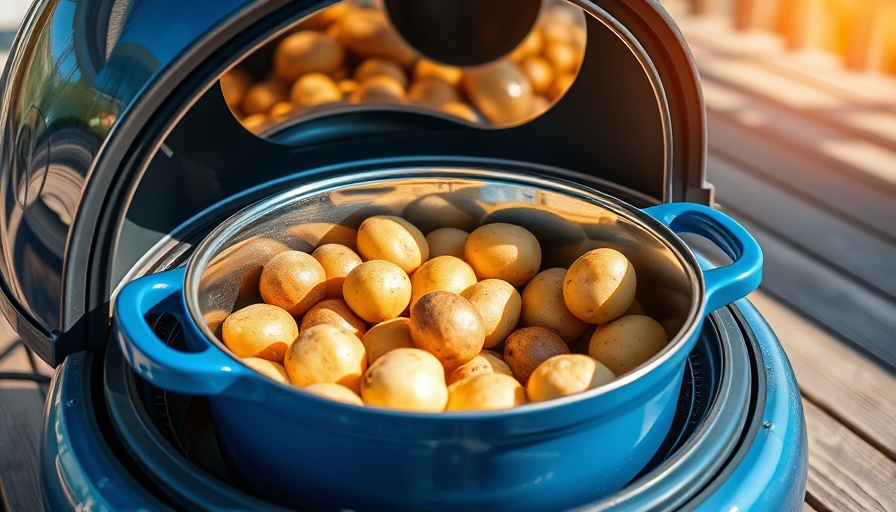
Solar Cooking: The Eco-Friendly Way to Prepare Meals
With summer temperatures soaring, the energy bills are climbing as well. But what if the sun could help alleviate that burden and provide a way to cook delicious meals? Enter solar ovens — a fantastic, eco-friendly method to cook outdoors without consuming any energy from electricity or gas. This approach not only reduces your carbon footprint but also adds an element of fun to your culinary adventures.
Five Delicious Recipes to Make in Your Solar Oven
You might think that solar ovens are limited to making s'mores and camping snacks, but they can actually be used for a wide range of meals. Imagine treating your guests at your eco-stay to meals that were prepared entirely by the sun! Here are five easy recipes to consider:
Solar Baked Potatoes: Wrap potatoes in aluminum foil and place them in your solar oven for about 2-3 hours, checking periodically.
Chili: Combine canned beans, tomatoes, and spices in a pot. Allow it to cook for 3-4 hours for a hearty meal that will warm the soul.
Solar Stew: Mix fresh vegetables with broth and let it simmer. This healthy meal can cook in around 2-3 hours.
Oven Roasted Veggies: Toss your favorite veggies with olive oil and herbs. Roast them for 2-3 hours for a crispy plateful.
Solar Bread: Yes, you can even bake bread. Use a dark pot and let it rise and bake for 3-4 hours.
Why Solar Cooking is Worth Embracing
Solar cooking is not just about saving electricity; it's also about bringing your guests into the experience of preparing food. Imagine telling your Airbnb visitors about your zero-waste practices and seeing how meals prepared under the sun can enhance their experience and leave a lower ecological impact.
The beauty of solar ovens lies beyond practicality. They’re an avenue for engagement, perfect for eco-conscious businesses looking to create memorable experiences. You can tell stories about sustainability while preparing meals that keep the earth healthy, aligning beautifully with the goals of environmentally responsible hospitality. With the right pots and placement in the sun, you can easily cook anything you might in a conventional oven.
Tips to Optimize Your Solar Oven Cooking
For those ready to dive into solar cooking, there are some important tips to keep in mind. Position your solar oven carefully for maximum sun exposure and adjust it every 30 minutes to maintain optimal cooking temperatures. Remember, a dark pot will absorb the sunlight better, leading to more efficient cooking.
Don't let browning deter you! While solar ovens may not create the browning and crispiness that conventional ovens do, they ensure your meals don’t dry out or burn, allowing you to experiment with flavor and texture.
The Future of Sustainable Cooking
Incorporating solar cooking into your hospitality offerings not only showcases your commitment to sustainability but also opens a dialogue with your guests about eco-friendly practices. As a small-scale hotel owner or an eco-lodge operator, offering solar-cooked meals could set you apart in an industry increasingly focused on sustainable practices.
As we look to the future, the advantages of solar ovens become even clearer. They require minimal resources and can help mitigate rising energy costs, making them an attractive option for entrepreneurs seeking to maximize their operational efficiency while demonstrating a commitment to sustainability. This innovative cooking method captures the essence of eco-friendly living, and it's something your guests will likely appreciate and remember.
Conclusion: Cooking with the Sun
Solar ovens represent a wonderful blend of sustainable living and culinary creativity. As a hospitality professional, embracing such practices can not only reduce energy consumption but also draw guests who are genuinely interested in participating in responsible tourism.
So why not take advantage of that summer sun? Your solar oven awaits! It's time to embark on a cooking journey that brings the beauty of nature right into your kitchen.
If you're eager to explore solar cooking or want to learn more about making your hospitality business more sustainable, consider reaching out to eco-conscious communities and resources. Join in, innovate, and lead the movement towards a greener future.
 Add Row
Add Row  Add
Add 




Write A Comment